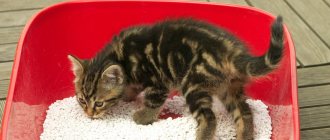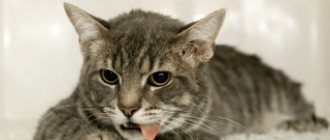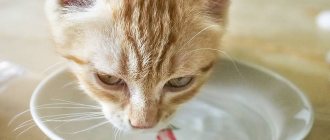Kitten sneezes - reasons
Sneezing is a natural defense mechanism to clear the airways. In most cases, cats sneeze several times a day, especially after washing themselves. Statistically, the most common cause of sneezing is irritation of the nasal passages, but the full list of causes is very extensive. You need to worry if your kitten's sneezing is chronic.
If you suspect a disease in your pet, it is better to immediately contact a veterinarian. If this is not possible, it is necessary to carefully monitor the development of the clinical picture. Unfortunately, one of the most common causes of sneezing in kittens is an infection or viral infection. When contacting a veterinary clinic, to determine the pathogen, a sample from the mucous membrane is analyzed.
Note! The development of a viral, bacterial or fungal infection can be prevented or controlled by early vaccination or immunostimulating therapy.
Sneezing with bloody discharge
If an animal sneezes with blood, it means that the nasal mucosa is damaged.
There are several reasons why this happens:
- ingress of traumatic foreign bodies or their prolonged presence in the nose;
- a sharp change in temperature after returning from the street;
- inflammatory process;
- muzzle injuries;
- exposure to irritants, especially aerosols.
Air fresheners, cigarette smoke, and various cosmetic sprays are very harmful to all cats. To protect the health of your pet, you need to choose high-quality household chemicals. When spraying aerosols, make sure that they do not get on the animal’s face. It is extremely undesirable for owners to smoke in the apartment; to do this, they need to go out onto the balcony or onto the street.
A single sneeze, even with blood, is a relatively safe symptom. Owners should be wary if a cat sneezes several times in a row or has bleeding from its nose. You can stop nosebleeds with a cold compress (a handkerchief soaked in cold tap water). There is no need to apply ice. Forcing a cat to raise its face is dangerous. If the compress does not help within 5-10 minutes, you need to go to a veterinary clinic.
Concomitant and side symptoms
If you suspect that your kitten is sneezing for some reason, you need to identify side symptoms that will indicate a diagnosis. The difficulty is that at an early stage of development, almost all respiratory, bacterial and viral infections have similar symptoms.
In addition, small kittens do not tolerate cold well, so the cause of sneezing may be hypothermia.
The kitten's eyes are watering
Practice shows that most often sneezing in kittens with a clinical complication is caused by the feline herpes virus. Small kittens become infected from adults who have access to free range and catch infected rodents. An infected kitten may be visually healthy until severe stress or another reason causes a weakened immune system.
With the feline herpes virus, the kitten's eyes become watery and there is extensive irritation of the mucous membranes and swelling. After infection, an atypical plaque may appear on the mucous membranes. However, plaque may be a symptom of herpes or a sign of secondary infection.
Note! The feline herpes virus is not dangerous to humans.
Eyes fester
Rhinotracheitis is one of the most common viral diseases in small kittens, especially those living on the street. The nature of the disease is viral, so rhinotracheitis affects the entire population of cats living in a certain area. Theoretically, a kitten can recover from rhinotracheitis without treatment and develop lifelong immunity. However, the surviving animal remains a carrier and infects other cats through airborne droplets or contact.
Important! A kitten that has had rhinotracheitis can live a long, fulfilling life. However, if you decide to adopt another pet (even an adult), it will become ill if it does not receive its initial vaccinations before moving into your home.
The primary symptoms during the development of the clinical picture of rhinotracheitis are very similar to a cold: the kitten sneezes, his eyes are watery, there is apathy, and a slight increase in body temperature.
Treatment and prevention of sneezing in kittens
It is difficult to give a definite answer to what to do if a kitten sneezes. After all, each disease requires its own treatment methods, which can only be prescribed by a veterinarian.
Do not self-medicate, even if you are sure that your kitten only has irritation from dust. An incorrectly selected set of medications can greatly harm your pet , and instead of wasting time, it is better to provide proper care right away.
The nasal cavity may be severely damaged, so the kitten is constantly sneezing, resulting in a risk of bleeding. The immunity of a newborn baby is very weak, and wasted days can cost him his life.
Only a doctor should look for the reason why an animal is sneezing. This disease can be treated as follows:
- allergy medications or medications that relieve asthma;
- antibiotics or antifungal drugs - in case of infections.
The most effective antibiotics are Maxidin and Fosprenil, which kill harmful microorganisms. In order to restore the animal’s immunity and health after an illness, you can use Baksin or Gamavit.
© shutterstock
Recipes often contain anthelmintic drugs, because worms can also cause an animal to sneeze.
If a newborn kitten sneezes due to a diagnosis such as cancer, the veterinarian will refer him to a course of chemotherapy. Treatment of teeth and gums eliminates dental problems.
But polyps in the nasal cavity cannot be treated; here they only resort to surgical intervention.
Possible diseases if a kitten sneezes
In addition to the above viral infections, possible diseases that cause sneezing in a kitten can be of a different nature. Unfortunately, the range of diseases is so wide that only a veterinarian can cope with the diagnosis.
The most dangerous are viral diseases, against which the kitten must be vaccinated.
If you pick up a baby on the street or buy it at a poultry market, the resulting viral diseases can cause its death.
Possible diseases of which sneezing may be a symptom are:
- Infectious peritonitis occurs without symptoms for a long time, and at an early stage of the clinical picture it is similar to a cold.
- Feline immunodeficiency virus is a slowly and secretly developing disease that adversely affects the body's immune system. When the cat's immunity level declines, it becomes vulnerable to any, even basic respiratory infections.
- Feline viral leukemia - in the first stages of development, is similar to a respiratory infection, in fact, it is a serious viral disease, which most often leads to death.
- Chlamydia - gives a complete picture of an acute viral respiratory infection complicated by bacterial infection. Unfortunately, chlamydia is highly contagious and common. One of the first symptoms of chlamydia is acute conjunctivitis.
- Mycoplasmosis is common, like chlamydia, contagious, and deadly. Mycoplasmosis progresses more slowly, but leads to more severe consequences: bacterial pneumonia and swelling of the respiratory tract.
Most viral infections cannot be diagnosed with guaranteed accuracy. To detect infection, blood is taken from the cat and examined for the presence of antibodies.
With viral infections, everything is a little more complicated; the causative agents of the disease must be found in the blood sample. This diagnostic method is called PCR. Unfortunately, PCR diagnostics are not available in all clinics and cost a lot of money, so most veterinarians, suspecting a viral infection in a kitten, begin complex, aggressive therapy.
Prevention
Effective preventive measures can help prevent many diseases in pets:
- regular antiviral vaccinations;
- systematic antiparasitic treatment;
- good nutrition, strengthening the immune system;
- removing sharp and small bones from feed;
- comfortable living conditions (absence of high humidity in the room, dampness, drafts).
Be sure to read:
What should you do if your cat develops a lump at or near the injection site after vaccination? When does a tumor become oncology?
In what cases is a visit to the veterinarian necessary?
You will not be able to handle treatment on your own if your kitten has contracted a viral infection. Your ward can survive if his immunity is strong enough to cope with the infection on his own. However, survival of kittens during viral infection is the exception rather than the rule.
In what cases is a visit to the veterinarian necessary:
- You know that your kitten has been in contact with virus carriers - it was picked up on the street, taken from a shelter, bought at a poultry market and does not have a vaccination document.
- The kitten has severe swelling of the eyes and ulcers on the mucous membranes.
- Against the background of loss of strength and severe depression, fever is observed.
- Constant drooling, copious nasal discharge, purulent discharge from the ears and eyes.
- Weight loss while maintaining appetite or a decisive refusal to eat.
- Enlarged lymph nodes.
- Wheezing or whistling when breathing, cough with or without phlegm.
- Breathing problems.
- Severe problems in the digestive system.
In addition, you should contact a veterinarian if the kitten does not have a severe clinical picture, but the sneezing continues for more than 3-7 days. Some viral infections develop secretly.
Immediately after infection, the kitten exhibits some symptoms, however, the immune system fights them. Under pressure from the immune system, the virus weakens, but remains in the body until the opportunity arises.
Treatment of cough at home
Therapy is determined by the complexity of the pathological process and is aimed at eliminating it:
- For invasive cough, antiparasitic procedures are prescribed, and in the future it is recommended to regularly prevent the disease.
- Attacks due to cardiac problems are eliminated by comprehensive treatment of the cardiovascular system and general cough suppressants.
- The specificity of antiviral and antibacterial therapy is determined by the characteristics of the cough: expectorants are prescribed for dry coughs, and antitussives for wet coughs.
- Asthmatic attacks are stopped by hormonal and glucocorticosteroid, antiallergic drugs.
- Special creams and pastes improve the condition of trichobezoar They cover the surface of hairballs and facilitate their natural release.
- Cough from injuries to the respiratory organs and throat subsides as they heal. If internal organs are injured, the pet is given crushed food. For external wounds, treatment methods depend on the severity of the pathology. In serious situations, the wound is surgically sutured and antibacterial therapy is carried out.
Be sure to read:
What to do if pus comes out of your cat’s nose, what could it be, should you be afraid?
A sick animal should have access to water, but it should not be forced to drink.
Veterinarians often combine antitussive therapy with immune restoration.
Prevention of colds, infectious and viral diseases in kittens
Prevention of viral diseases is considered an essential aspect of kitten care. It is important to understand that even the highest quality vaccines do not guarantee that the kitten will not get sick. However, statistics show that vaccinated animals infected with a viral infection tolerate the disease much easier.
Note! According to generally accepted recommendations, the kitten should be kept in quarantine until it receives basic vaccination.
The mother’s immunity protects the baby only until the age of three months, after which the kitten’s body will have to fight pathogens on its own. Prevention of colds and bacterial diseases includes high-quality care and comprehensive protection of the pet from contact with sources of infection. The source of infection can be stray animals, places where garbage accumulates, wild rodents, etc.
Associated symptoms
Symptoms that accompany sneezing can signal many other problems. These signs include:
- eye discharge, swelling or ulcers;
- excessive nasal discharge, sometimes yellow or green (a sign of a bacterial infection);
- fever;
- excessive drooling;
- decreased appetite or weight loss;
- enlarged lymph nodes;
- shortness of breath or cough;
- bad skin;
- labored breathing;
- diarrhea.
The kitten is sneezing: what to do, how to cure it?
Before getting a kitten, it is recommended to thoroughly clean your home. Try to remove all dust in the room, outdated items with scuffs, especially tablecloths and scuffs; it is recommended to lay out clothes and hang them in closets.
When your new pet arrives at home, first of all, observe its behavior. Most often they start by walking around and sniffing the area around it. So, if you see how an animal, approaching another thing, suddenly begins to sneeze and snort, it should be removed as far as possible.
After you establish the true cause of sneezing, you must first begin symptomatic treatment. However, it is not recommended to do this yourself, since these can be quite serious diseases, such as toxoplasmosis, microplasmosis or leukemia. What is the best way to proceed in this case, it is better to ask your veterinarian.
During a child’s illness, it is necessary to provide him with everything he needs: food, warmth, peace. If the cause of his suffering is damage to the respiratory tract, try to provide the animal with all the necessary assistance: help in cleaning the nose, discharge from the eyes, and regularly inspect its mouth and throat. It is also recommended to add as many readily available components and vitamins to his diet as possible.
If you observe a kitten constantly sneezing, and its allergy does not go away, but causes its condition to worsen, you should show it to a specialist as soon as possible. You should not hesitate to do this, the faster he is delivered to the veterinary clinic, the faster he will be healed, fortunately, today the abundance of high-quality and affordable drugs allows you to do this without much effort.











